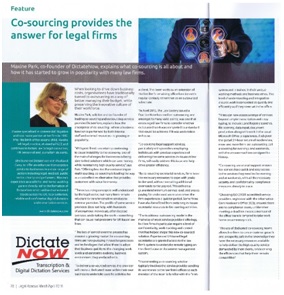Legal Abacus readers learn more about the benefits of co-sourcing important business functions
Readers of Legal Abacus recently found out more about the growing popularity of co-sourcing as an important business function, discovering the benefits it can bring.
Legal Abacus is the bi-monthly magazine for member of the ILFM, aimed at individuals working within Legal Finance or Legal Management roles.
The main aim of Legal Abacus is to communicate and inform members about what is happening within education and career development, legal accounting and business management, and in the wider legal sector as a whole.
The article highlights how co-sourcing can be an effective way of completing important business functions, allowing companies to improve productivity while saving money.
The article can be found in the March issue of Legal Abacus magazine.
Alternatively, read the article here:
Co-souring provides the answer for legal firms
When looking to drive down business costs, organisations have traditionally turned to outsourcing as a way of better managing their budget, while preserving the innovative culture of their workforce.
Maxine Park, solicitor and co-founder of leading co-sourcing and outsourcing services provider DictateNow, explains how the emergence of co-sourcing – where a business function is performed by both internal staff and external resources – is growing in popularity.
“With post-Brexit uncertainty continuing to cause instability to the economy, one of the main challenges for businesses is being able to find solutions which can save money, while maintaining high quality service,” says Park. “Offering less risk than outsourcing or multi-sourcing, co-sourcing is leading the way as a cost-effective alternative that provides customers with value for money.
“The outsourcing concept is well understood by the legal sector, but many firms remain reluctant to transfer sensitive services to external providers. The profile of some service providers does not help, with hundreds of anonymous individuals, often located overseas, undertaking the work – something that can cause real problems for UK-based law firms.
“This lack of control over the process has ensured a growing market for co-sourcing. Firms are now pursuing innovative processes and technologies that allow them to adapt their business quickly to the changing work levels and constantly evolving business environment they are faced with.
“To deliver a co-sourced service, the provider will create a dedicated team within their own business to undertake specific activities for a client. This team works as an extension of the law firm’s remaining office function with regular contact, rather than as an outsourced substitute.
“In April 2015, The Law Society issued a Practice Note focussed on outsourcing and amongst its many valid points, was one that encouraged law firms to consider whether outsourced work was completed to a standard that could be achieved if it was undertaken in-house.
“Co-sourcing legal support services, particularly with providers employing individuals with previous experience of delivering the same services in-house at law firms, will easily address this issue and help drive greater efficiency.
“By co-sourcing secretarial services, firms have the necessary resources to cope with peaks in demand, without recruiting additional overheads to the pay roll. This delivers a guaranteed minimum service level, and avoids paying for underused secretaries when the firm experiences a quieter period. Some firms have also benefitted from switching in-house secretarial resources to fee-earning activities.
“The traditional outsourcing model is the mainstay of most service providers’ offerings, but law firms in particular require a level of confidentiality, work tracking and control that has helped shape this new co-sourced solution. Experienced UK-based legal secretaries are granted access to the law firm’s system to undertake remote typing on the client’s case or document management system.
“Implementing a co-sourcing solution typically involves the service provider sending its secretaries to the law firm’s offices so each member of the team is familiar with the firm’s system and is trained in their unique working methods and business ethos. This level of understanding and integration ensures work is completed as quickly and efficiently as if they were sat in the office.
“Firms can now access a range of services beyond simple transcription and copy typing, to include Land Registry searches, file opening, data input, document production along with work in the usual Microsoft Office programmes. And given the global 24-hour nature of modern law, more and more firms are outsourcing call-answering for evenings and weekends, with the answer-machine consigned to history.
“Co-sourcing secretarial support ensures fee-earners have quick and easy access to the services they need in the evening and at weekends, with all the necessary security and confidentiality compliance measures already in place.
“Choosing ISO 27001 accredited service providers, registered with the Information Commissioner’s Office (ICO), ensures there are no compliance issues, unlike when meeting a deadline means a member of the office team is tempted to take work home on a memory stick.
“The use of dedicated co-sourcing teams allows law firms to concentrate on growth and prosperity, safe in the knowledge they have the necessary resources available to help deliver the high-quality service demanded by their clients, while driving the efficiencies that help them remain competitive.”
About the author: Maxine specialised in commercial litigation and was made partner at her firm in 1992. When Maxine had her first child she worked from home. After the birth of her second child, she left legal practice, attained a PGCE and continues to lecture law to legal executives, HR personnel and journalism students.
She launched DictateNow with husband Garry, to offer an enhanced transcription service to businesses in a wide range of sectors including legal, medical, public sector, charity and parliament. Maxine’s experience as a solicitor and home-working parent directly led to the formation of DictateNow which utilises home-based typists across the UK, to provide fast, reliable and confidential digital dictation and transcription services.







